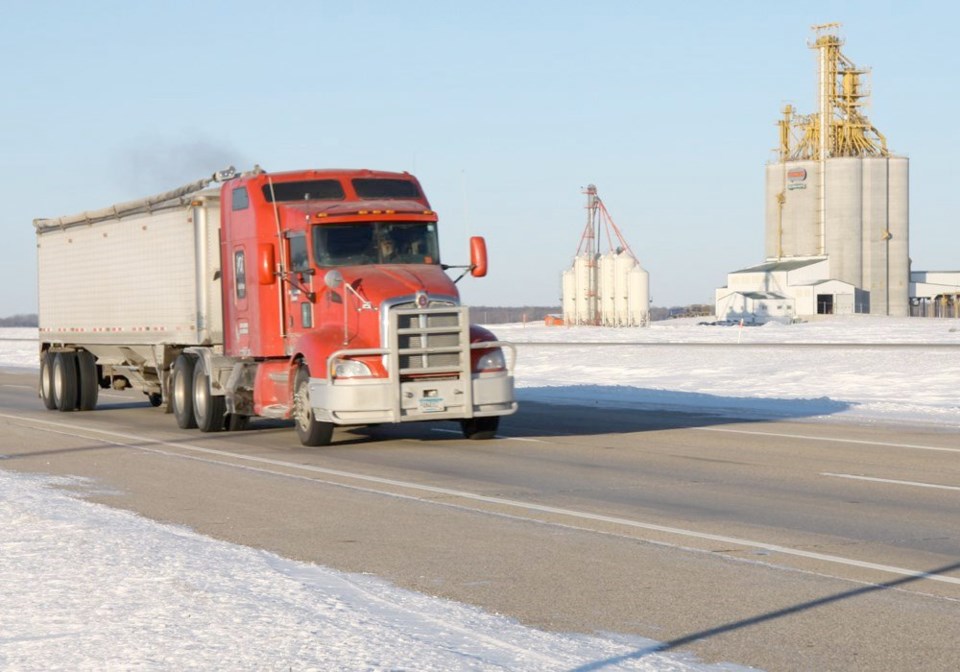WESTERN PRODUCER — The federal Conservative critic for national supply chain resilience says Ottawa should expect more trucker demonstrations and blockades if it pushes ahead with additional vaccine mandates that affect interprovincial truck traffic.
Prince Albert MP Randy Hoback said Ottawa’s policies promoting mandatory vaccinations in the commercial trucking industry have already caused avoidable frustration among many truck drivers.
A federal mandate that requires truckers crossing the Canada-United States border to be vaccinated against COVID-19 took effect Jan. 15, seven days before the Americans brought in a similar measure.
Ottawa has indicated the mandate will eventually be extended to all federally regulated industries, including commercial truckers crossing interprovincial borders, but the government has not said when that will happen.
Hoback said Liberal Prime Minister Justin Trudeau indicated Feb. 2 that he still intends to impose interprovincial mandates.
“When we asked a question (in question period) about whether he (Trudeau) is going to bring in a mandate on truckers crossing provincial borders, he basically said he’d be bringing something like that forward,” Hoback said.
According to Hansard, the prime minister told the House of Common Feb. 2: “We will continue, as we told Canadians we would in the last election, to encourage strongly all Canadians to get vaccinated, including with mandates for anyone who travels by plane or train, including members of the federal public service and including people in federally regulated industries. The way we get through this is through vaccines, and that is what we are going to stay steadfast to.”
Hoback said pushing ahead with interprovincial mandates will only inflame an already frustrated segment of the Canadian trucking industry.
“We already know that there are (thousands) of trucks a day that won’t be coming across the (Canada-U.S.) border,” he said.
“Now, if we start restricting trucks across provincial borders, we’re really going to feel that pain in our smaller communities. It’s going to create a situation where people are even madder.”
Hoback and other Conservative MPs have been warning for several weeks that COVID-19 policies that restrict long-haul truck traffic could have costly consequences for the Canadian economy.
Last month, members of the Conservative shadow cabinet sent an email to federal transportation minister Omar Alghabra, warning of unnecessary disruptions to the Canadian supply chain.
The email, co-signed by Hoback, was sent to Alghabra on Jan. 21, roughly a week before a convoy of trucker protesters arrived in the nation’s capital.
“Throughout the COVID-19 pandemic, truckers have rightfully been heralded as the unsung heroes, keeping our supply chains moving,” read the Jan. 21 email.
“At the beginning of the pandemic, the Liberal government rightfully deemed the trucking industry an essential service. Still, amidst the same pandemic, your government has now targeted the industry and is forcing thousands of truckers off the road.”
Sylvain Charlebois, an expert on Canadian food supply chain issues, said Ottawa should choose its path forward carefully.
“I think it (applying vaccine mandates to interprovincial truckers) would be the silliest policy ever,” Charlebois said.
“It would be unbelievably irresponsible to start looking at interprovincial trade from a public health perspective.…
“Playing around with the international border was risky enough. It was adding fuel to the fire. I’m not sure it would be a good idea to start playing around with interprovincial borders as well.”
Charlebois said applying vaccine mandates to interprovincial truck traffic probably wouldn’t have a significant impact on grocery store inventories.
“The economics within the food supply chain are so strong, it’s going to keep moving things along,” he said.
“That’s the easy part.”
But interprovincial mandates will almost certainly have an inflationary impact on Canadian food prices, he added.
Over the past three to four weeks, truck freight costs from the southern United States to Canada have already increased between 25 and 100 percent, depending on the destination, he said.
Although vaccine mandates may not be solely responsible for higher freight costs, they were certainly a contributing factor.
Placing additional restrictions on interprovincial truck traffic will have a predictable effect on Canadian grocery prices, he added.
“When it comes to food prices, it can only mean one thing. Higher food prices for consumers.”
“When it comes to food security, I think we’ve come to a point where we need to figure out a more functional balance between saving lives and keeping Canadians fed,” he said.
“We really need to think hard about how we’re prioritizing food security in this country during a pandemic. It’s not something we should take for granted.”





